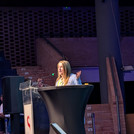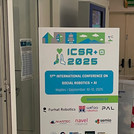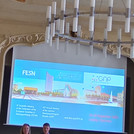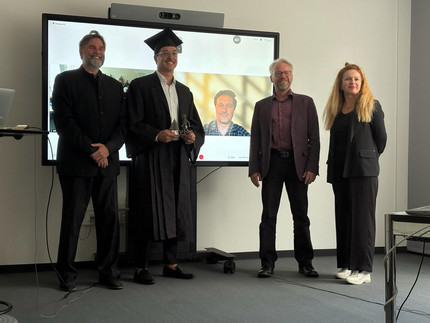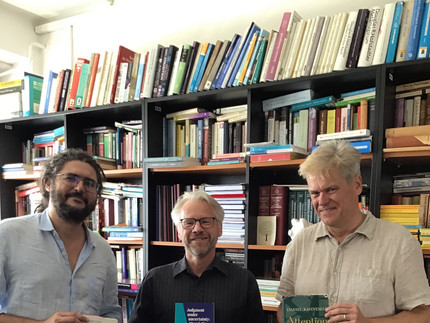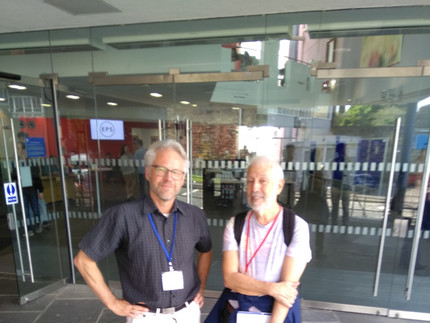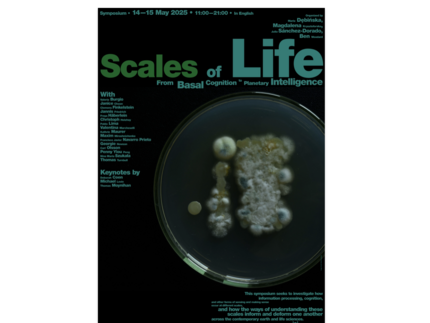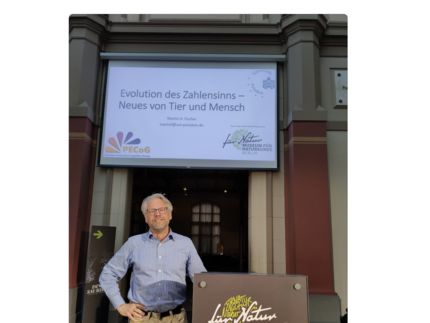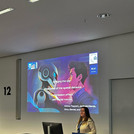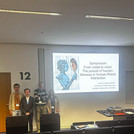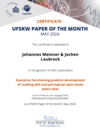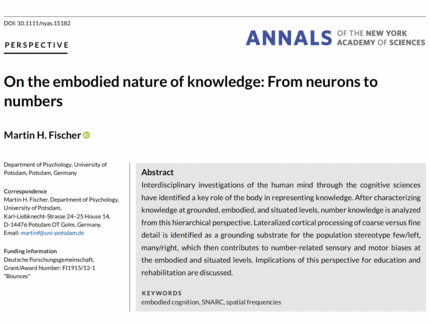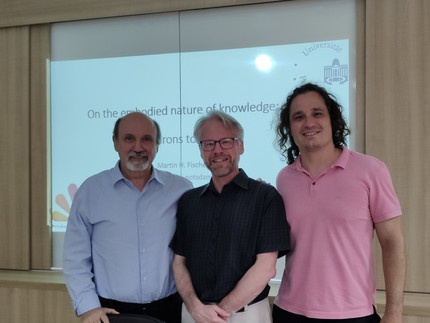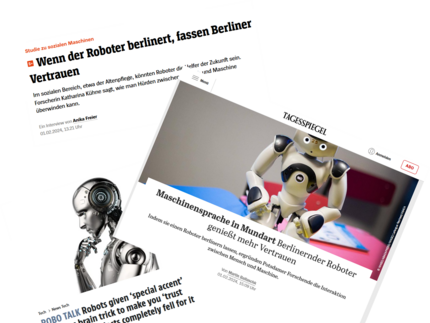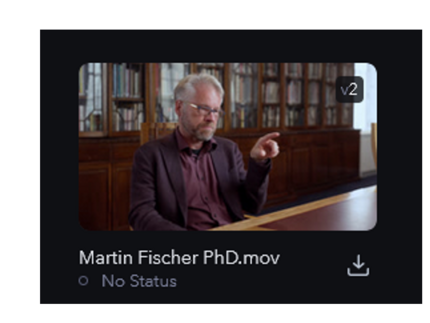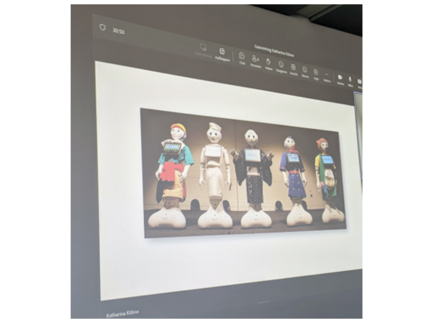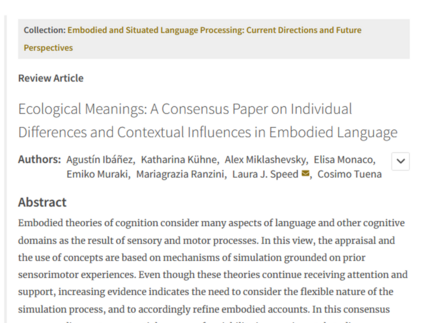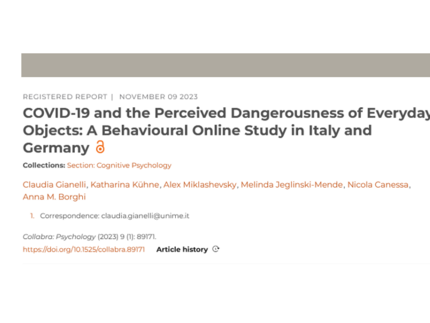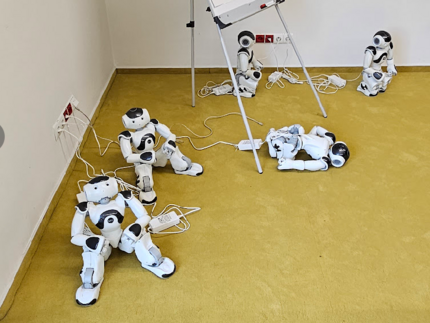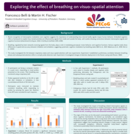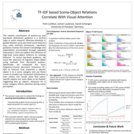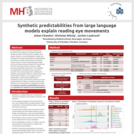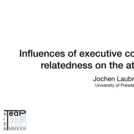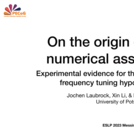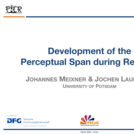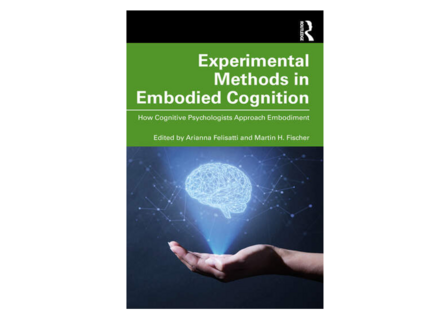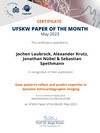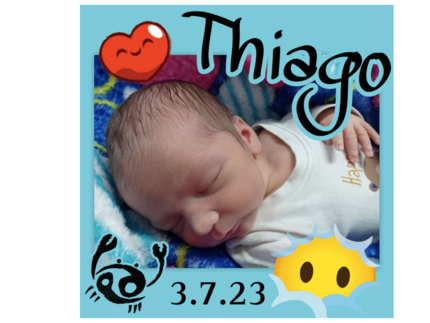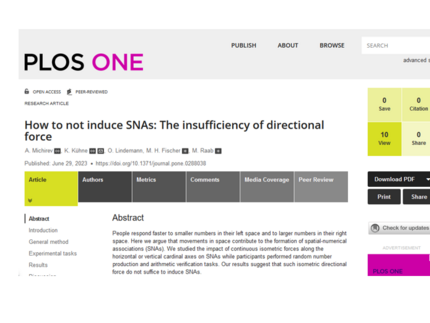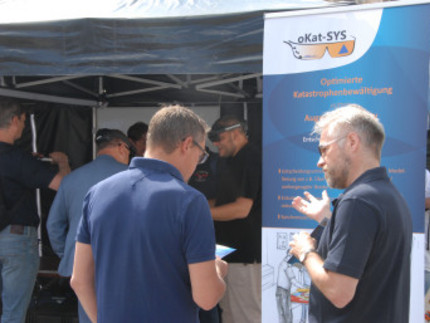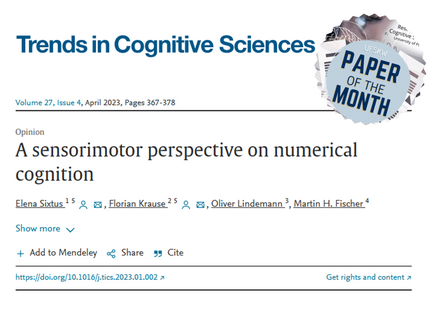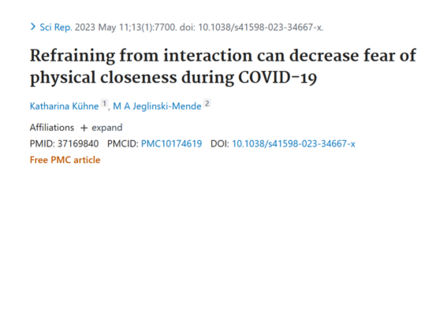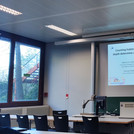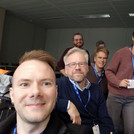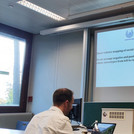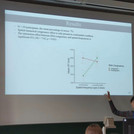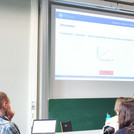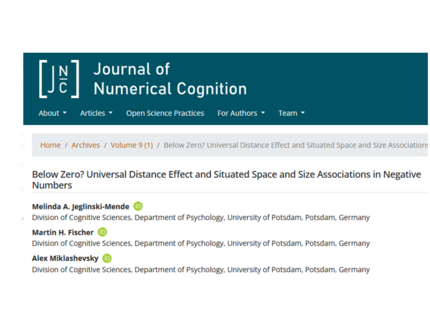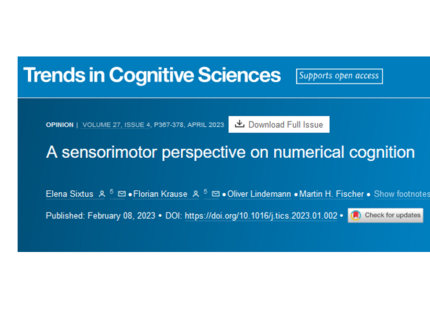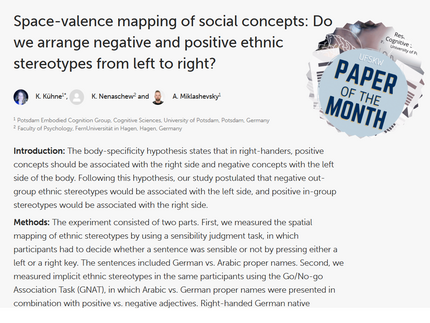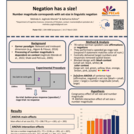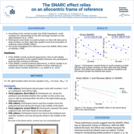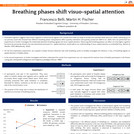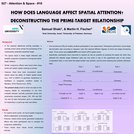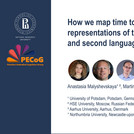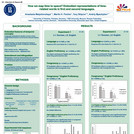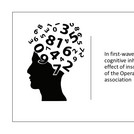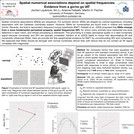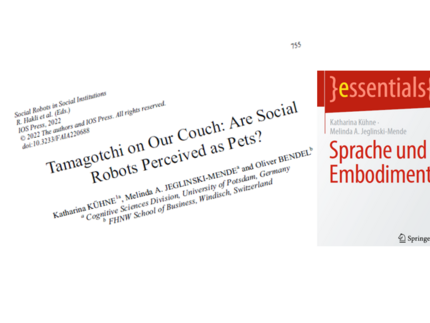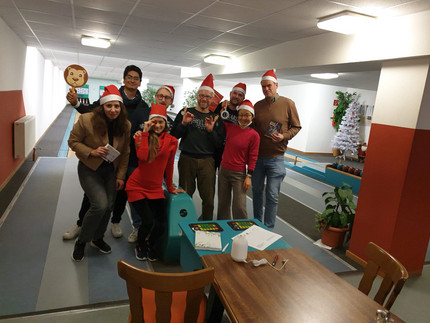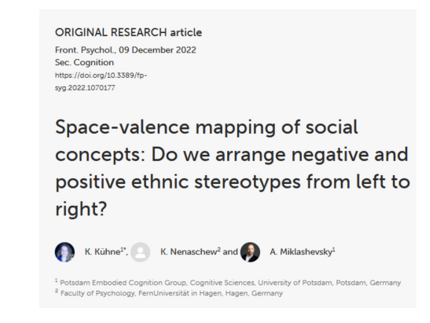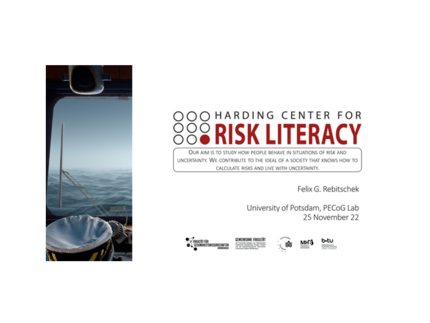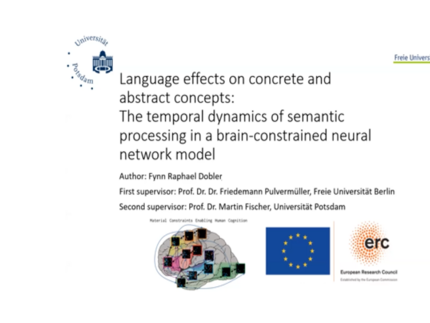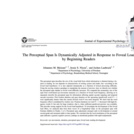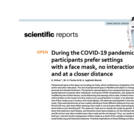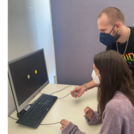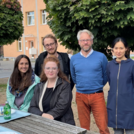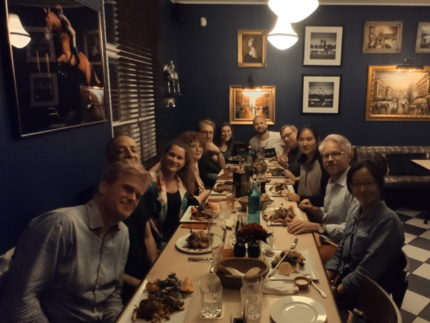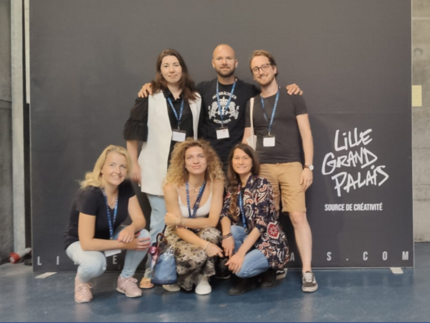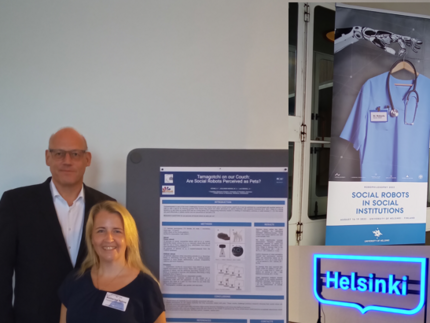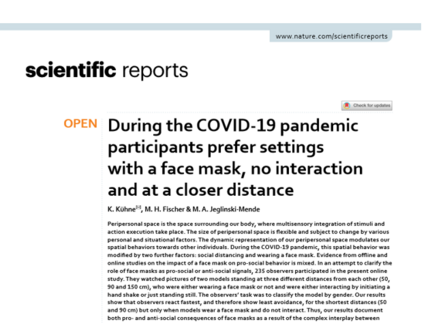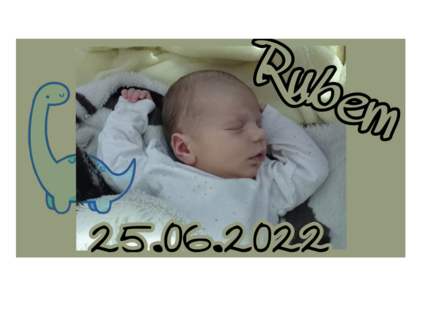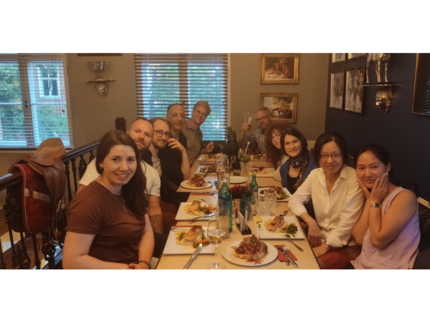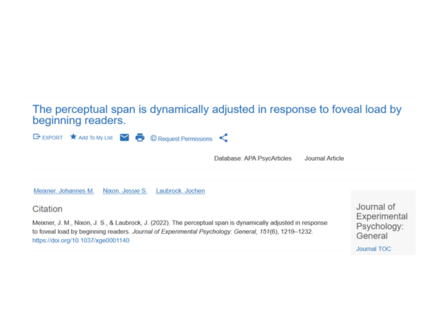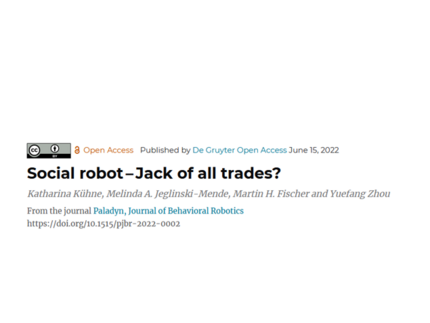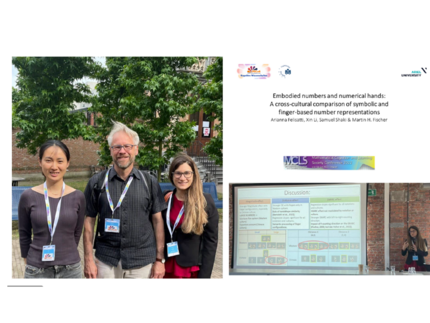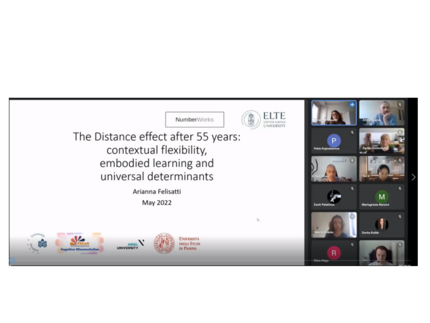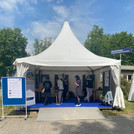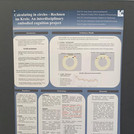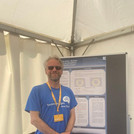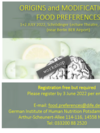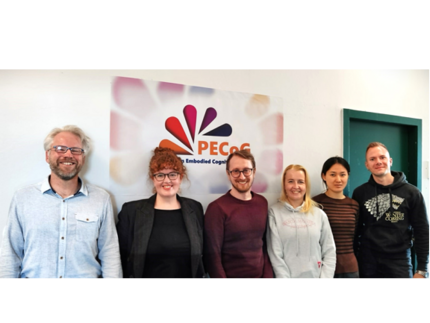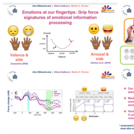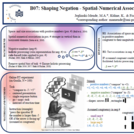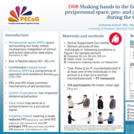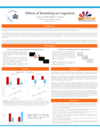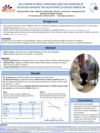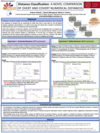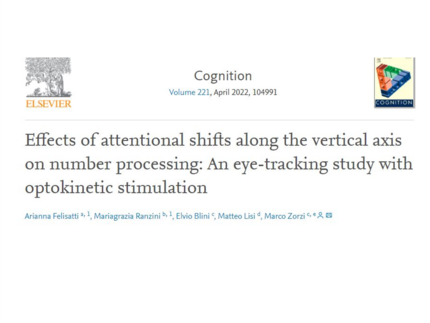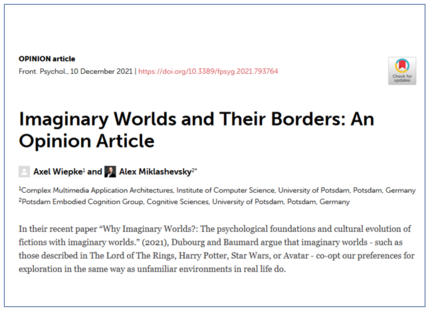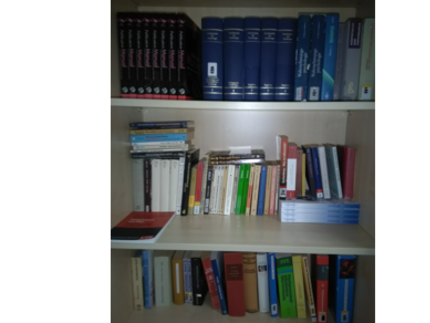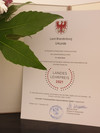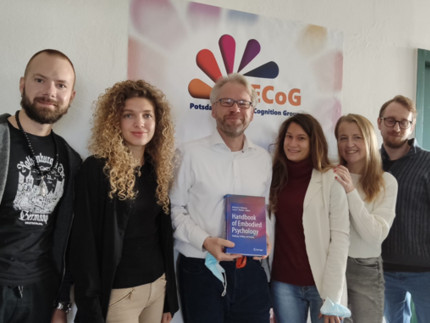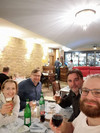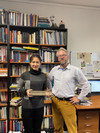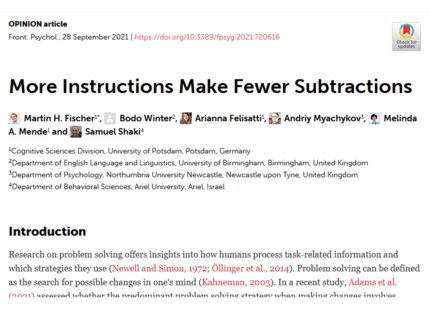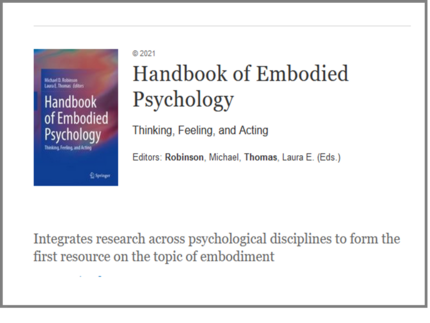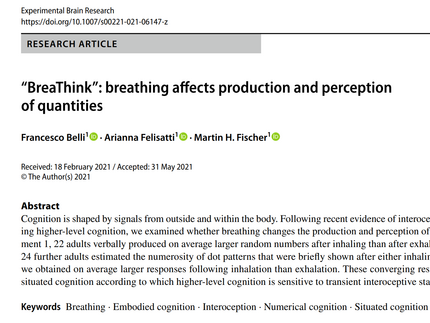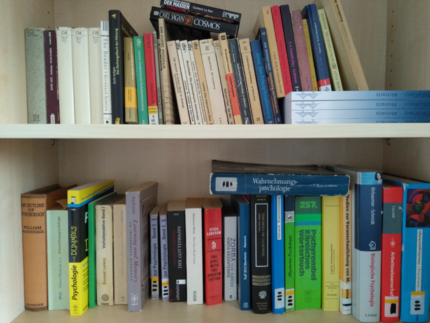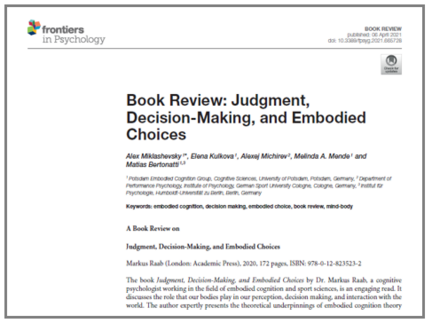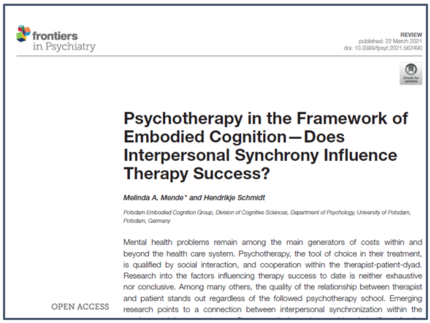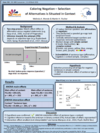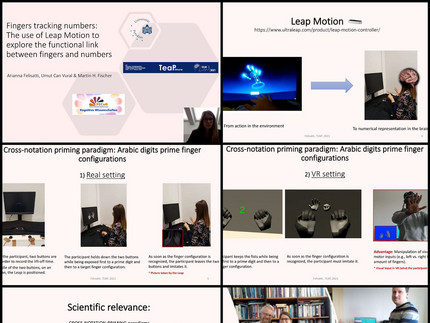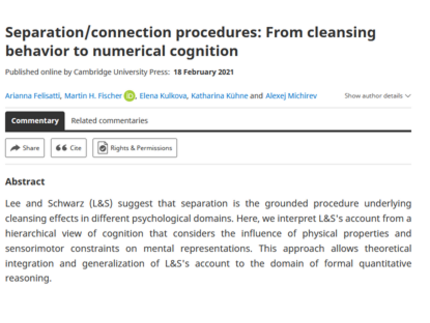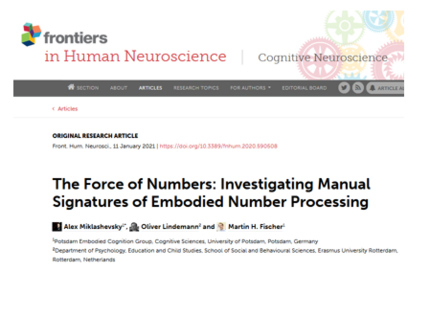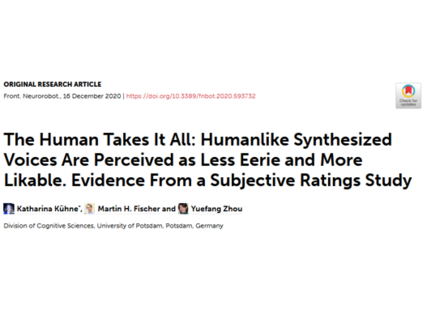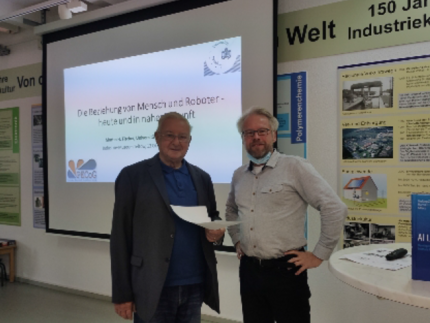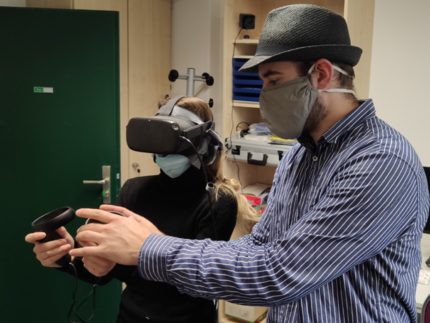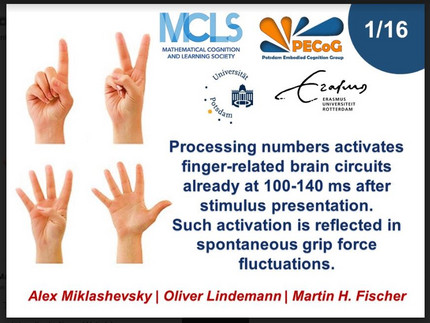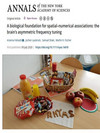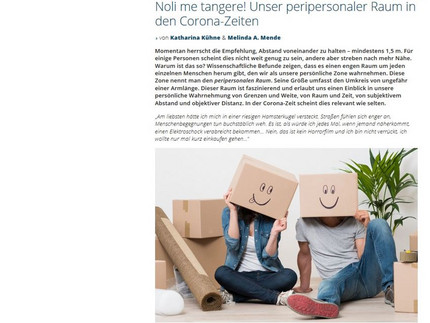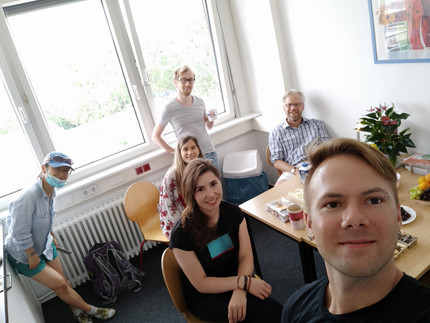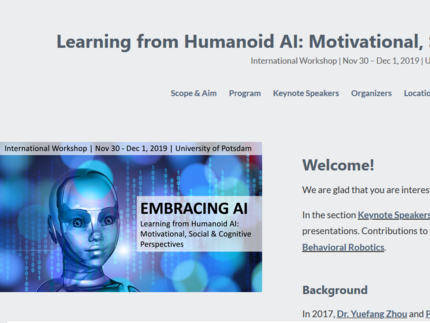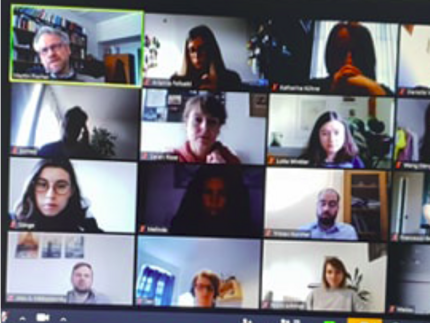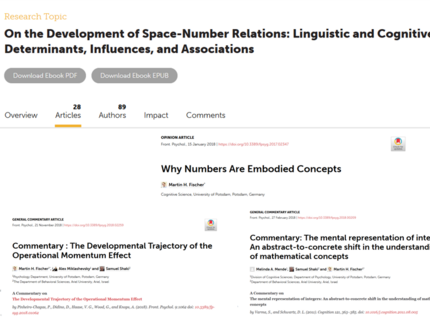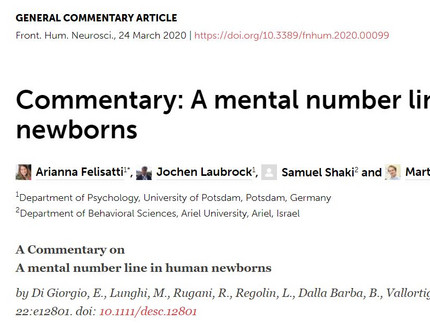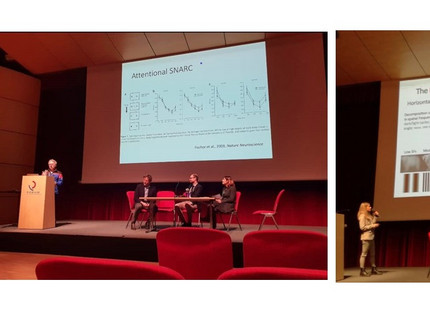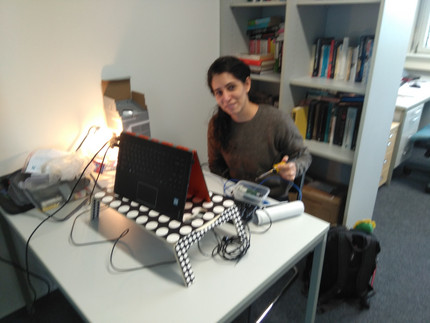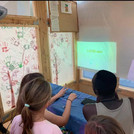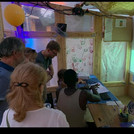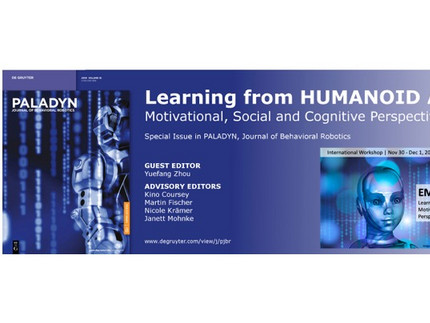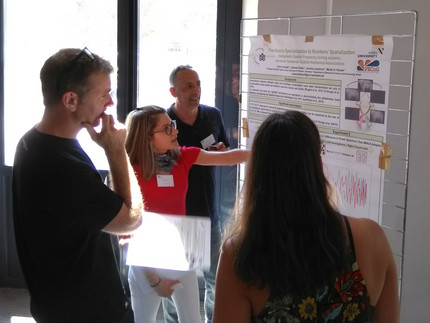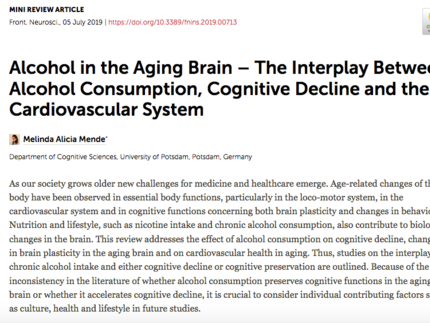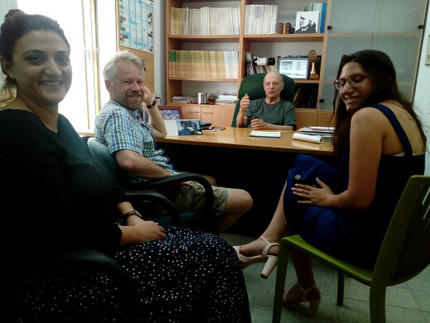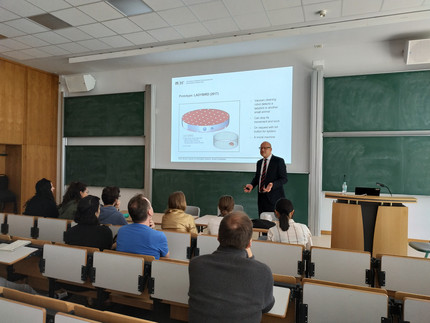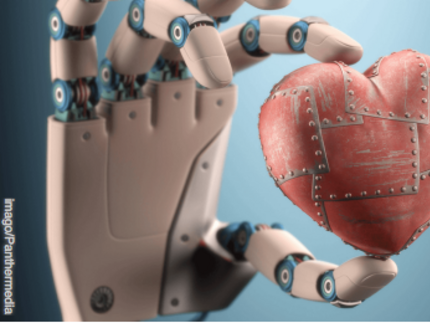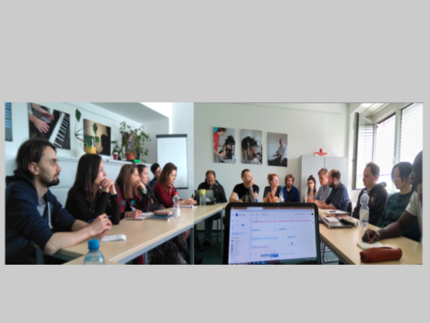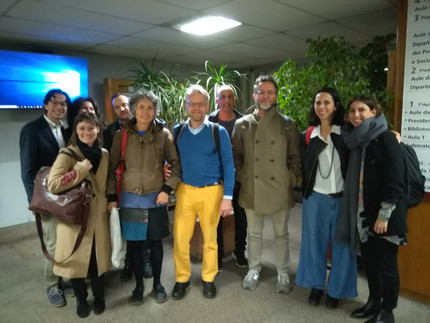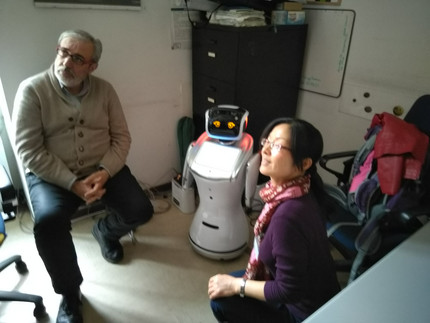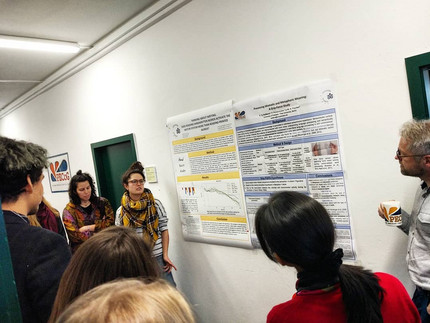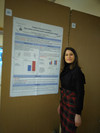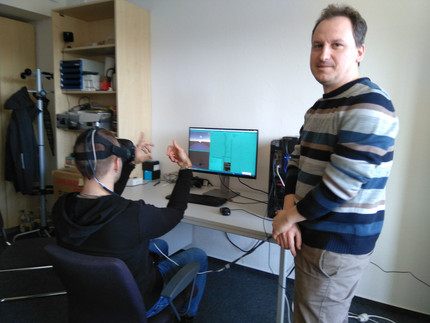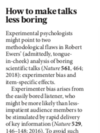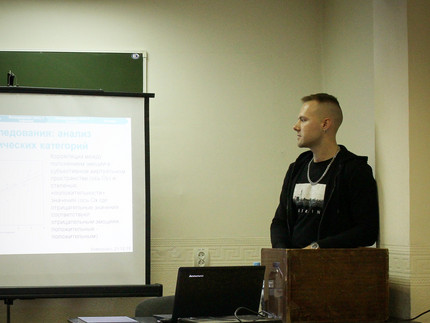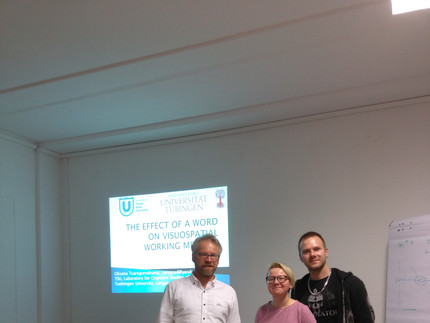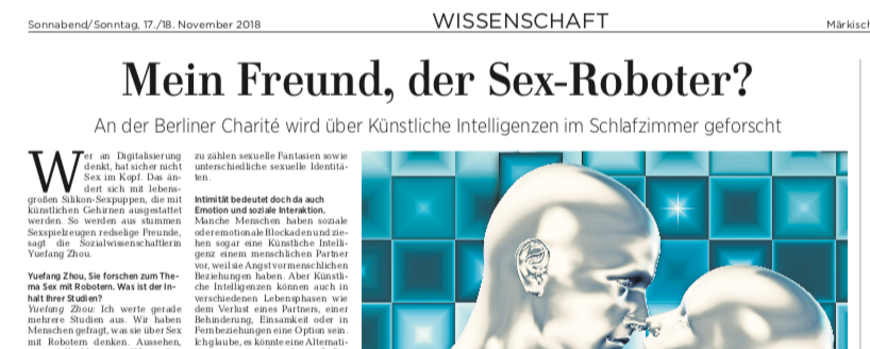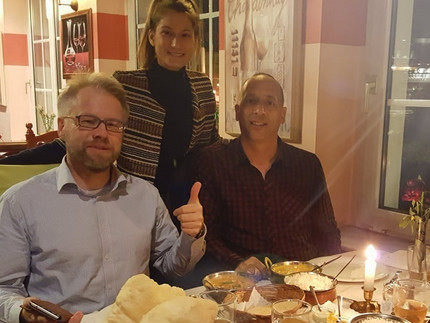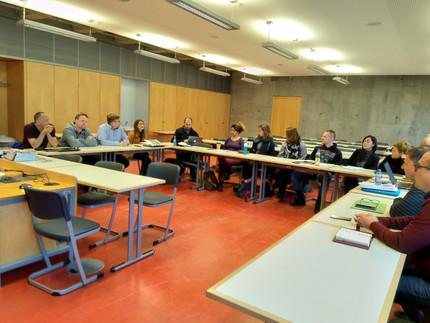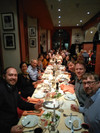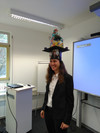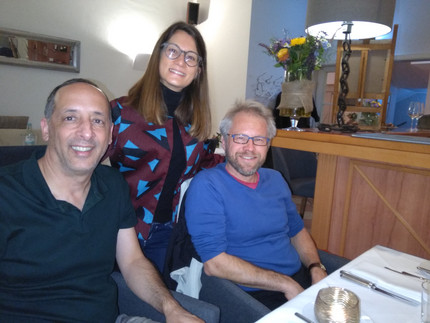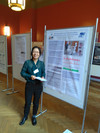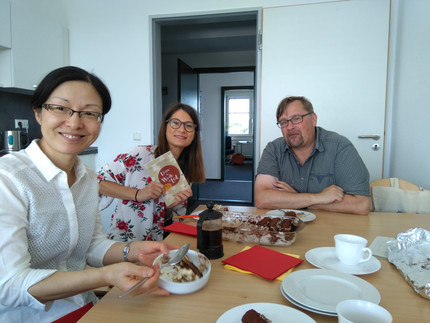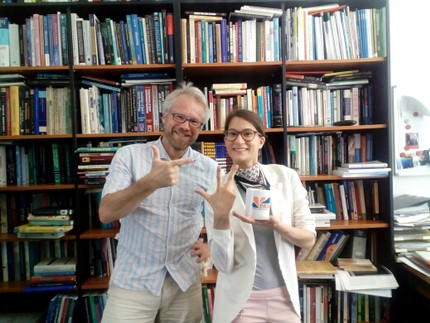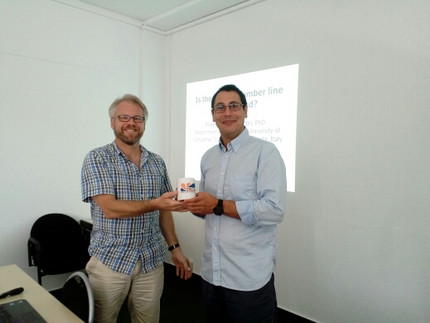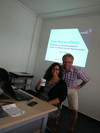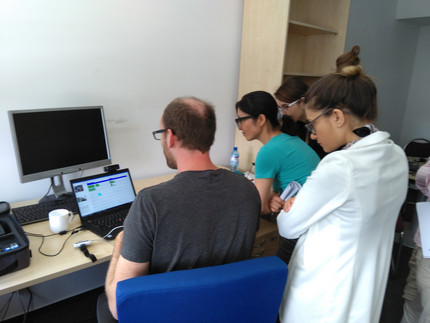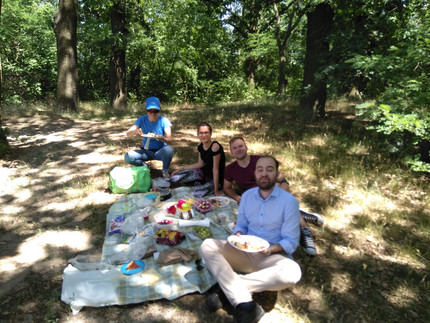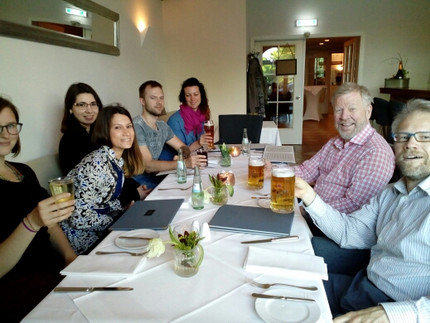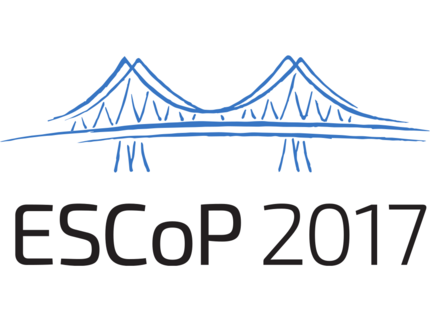News
Dr. Kühne Presented Research in Leipzig and Naples
Dr. Katharina Kühne recently gave two conference talks: one at the FESN Congress & GNP Annual Meeting 2025 in Leipzig, and another at the International Conference on Social Robotics and AI in Naples, Italy.
In Leipzig, she presented her research on sleep impairments and inhibition in COVID-19 patients. In Naples, she discussed a study exploring how small talk with a robot can help reduce stress. This latter project was carried out in collaboration with her outstanding student Antonia Klöffel, who also shares first authorship of the corresponding publication.
Congratulations to Dr. Jannis Friedrich on His Successful PhD Defense!
On September 5, 2025 our associated PECoG Jannis Friedrich from the German Sport University Cologne successfully defended his PhD thesis on "A Holistic Reading of Grounded Cognition: Embodiment from Life to Mind". The photo shows the dissertation committee, from left to right: Professor Markus Raab, Dr Jannis Friedrich, Professor Giovanni Pezzulo, Professor Martin Fischer and Dr Anna Ciaunica.
Exploring Cognition and Emotion in Religious Contexts with Prof Matoso
On 29 July 2025, Professor Renato Matoso from PUC/Rio in Brazil visited the PECoG lab to collaborate on the relationship between cognition and emotion in religious contexts. As fans of the work of Daniel Kahneman, we also generated a Hebrew-congruent time line with some of his famous books (see photo).
Reunion at the EPS Meeting in Dundee - Conference 8-11 July 2025
From 8 to 11 July 2025, Prof Fischer participated in the Meeting of the Experimental Psychology Society in Dundee/Scotland, his old place of work before he came to Potsdam. Among others, he met Prof Raymond Klein from Dalhousie University in Halifax/Canada to discuss the premotor theory of attention, on which both have worked for a long time. Quite fittingly, the photo shows them in front of the Dalhousie Building where the EPS conference took place.
Conference Attendance: Scales of Life - Symposium 14-15 May 2025
Jannis Friedrich recently attended the Scales of Life Symposium in Berlin, organized by the Institute for Cultural Inquiry (ICI). He presented on the Gaia Hypothesis, which says that the earth should be viewed as a single organism. Applying recent work done with Prof. Fischer on the free-energy principle, he presented on what cognition looks like in Gaia, based on research on ‘liquid brains’ like ant colonies, bacteria, or moulds.
Pictures and a full program can be found here: https://www.ici-berlin.org/events/scales-of-life/
The evolution of number sense - news from humans and animals
On 25 April 2025, Prof Fischer delivered a talk about "The evolution of number sense - news from humans and animals" to the general public in an evening lecture at the Berlin Museum of Natural Sciences. The talk was situated in the famous dinosaur hall and appropriately began with reference to the Ishango bones.
The talk was in German and was recorded together with the discussion, see here: https://www.youtube.com/watch?v=N2ANmGIIvBY
PECoGs at TeaP 2025 Conference
Katharina Kühne and Jaime Riascos attended the TeaP Conference in Frankfurt/Main (TeaP 2025). Katharina Kühne organized and chaired a symposium on Human-Robot Interaction, titled "From Metal to Mind: The Pursuit of Human-Likeness in Human-Robot Interaction." The symposium featured esteemed international speakers, including Prof. Roger Moore (Sheffield, UK), Dr. Bing Li (Lille, France), Jan Pohl (Dresden, Germany), and Dr. Jakub Możaryn (Warsaw, Poland). Together, they explored the psychological and social implications of human-likeness in social robots. She also delivered a talk at this symposium on replicating the distance compression effect with social robots. This study was conducted in collaboration with her outstanding student, Anika Tappert.
Additionally, Jaime Riascos presented a poster at the conference.
New Paper: Issues in Grounded Cognition
A recent paper Prof. Fischer co-authored with Jannis Friedrich and Markus Raab from the German Sport University was published. They discuss how mental representations must be grounded (and why AI’s cognition is not), the theories in the field, and their problems, and their no-nonsense solution that focuses on simple mechanisms and basic certainties.
It is open access thanks to the European Society for Cognitive Psychology (ESCoP): https://journalofcognition.org/articles/10.5334/joc.444
Conference Attendance: Situated Cognition Spring School in Bochum
Jannis Friedrich presented at the Situated Cognition Spring School in Bochum (24.03.-27.03.). He presented a paper recently submitted with Prof. Fischer on integrating new predictive processing approaches with embodied cognition.
Award UFSKW Paper of the Month
Johannes Meixner and Jochen Laubrock won the UFSKW paper of the month award (May 2024) for their paper “Executive functioning predicts development of reading skill and perceptual span seven years later” published in the Journal of Memory and Language (2024). https://doi.org/10.1016/j.jml.2024.104511
New Publication
Prof. Fischers latest review on embodied numbers has been published and is available open access. You can read the full article at the following link: http://doi.org/10.1111/nyas.15182
For a summarized version of the content, check out this recent recording available here: https://videoup.uni-potsdam.de/Panopto/Pages/Viewer.aspx?id=ab3c556e-bf30-4669-8737-b1a700e28fc8.
Prof Fischer showcases our research at PUC Rio
As part of his sabbatical networking, Prof Fischer presented an overview of research from our group at the Pontifical Catholic University (PUC) in Rio de Janeiro. The photo shows him with the host Prof. Jesus Landeira-Fernandez (left) and the organizer Prof. Cesar Renno-Costa (right).
International media presence of our group on the topic of “Robots and Dialects”
Our study about humanoid robots talking in Berlin dialect received a high amount of attention in the media:
https://www.the-sun.com/tech/10226575/robot-speech-accent-local-dialect-social-experiment/
https://interestingengineering.com/culture/robots-speaking-local-dialects-gain-more-trust
We congratulate our group member Katharina Kühne!
Interview with Prof Fischer
In a recent interview, Prof. Fischer provided cognitive science input for a world-wide project on "religious paratext", i.e. the study of marginal information in medieval documents. The recording can be downloaded here.
Love with AI is on everyone’s lips
There was an interview with Florian Gann (reporter) for Valentine's Day. The interview led to a great article. The article (in German language) can be read here.
Guest lecture at the FHNW School of Economics
In the elective module “Social Robots” II, Katharina Kühne, who is doing her doctorate on social robots in the PECoG group and is supervised by Prof Fischer and Prof Bendel, gave a lecture. The topic was her article “'Ick bin een Berlina': dialect proficiency impacts a robot's trustworthiness and competence evaluation”, which was published on January 29, 2024 in Frontiers in Robotics and AI. The co-authors of the article are Erika Herbold, Oliver Bendel, Yuefang Zhou and Martin H. Fischer.
Further information at: https://www.informationethik.net/
New publication
Some of our group members published a Review Article entitled “Ecological Meanings: A Consensus Paper on Individual Differences and Contextual Influences in Embodied Language”.
Authors: Agustín Ibáñez, Katharina Kühne, Alex Miklashevsky, Elisa Monaco, Emiko Muraki, Mariagrazia Ranzini, Laura J. Speed, Cosimo Tuena
doi: 10.5334/joc.228
Two keynotes on embodied numerical cognition
As part of the International Workshop "Language of Neurons" (Barcelona/Spain, 15+16 Sept 2023), Prof Fischer gave two lectures, one on the recent research of PECoG on embodied numbers, the other for a general audience.
Both were parts of a longer series of talks by international experts, and the two video recordings of the entire series of talks can be found here:
https://natconference.museuciencies.cat/en/press/multimedia-material/
Martin's research talk on Friday: 2:37-3:16
Martin's general talk on Saturday: 1:06-1:24
New publication
The registered report COVID-19 and the Perceived Dangerousness of Everyday Objects: A Behavioural Online Study in Italy and Germany by Claudia Gianelli, Katharina Kühne, Alex Miklashevsky, Melinda A. Jeglinski-Mende, Nicola Canessa, and Anna M. Borghi was published in Collabra Psychology.
HRI Summer School
In autumn 2023, our doctoral student Katharina Kühne took part in the HRI Summer School in Chęciny near Warsaw. The event offered many interesting insights into current research on the topic of human-robot interaction. For example, demonstrations with robots were given (like the humanoid robot Nao - here charging their batteries, see picture).
Our PECoGs at conferences
In summer/autumn 2023, our group members attended some national and international conferences and meetings giving talks and poster presentations:
- Belli, F., & Fischer, M. H. Exploring the effect of breathing on visuo-spatial attention. ESCoP Porto.
- Çelikkol, P., Laubrock, J., & Schlangen, D. TF-IDF based Scene-Object Relations Correlate With Visual Attention. ETRA Tübingen.
- Chandra, J., Witzig, N., & Laubrock, J. Synthetic predictabilities from large languagemodels explain reading eye movements. ETRA Tübingen.
- Kühne, K. & Miklashevsky, A. Not on time alone? Situated flexibility of embodied time concepts. ESLP Messina.
- Laubrock, J. Influences of executive control and semantic relatedness on the attentional blink. TeaP Trier.
- Laubrock, J., Li, X., & Fischer, M. H. On the origin of spatial numerical associations Experimental evidence for the brain's asymmetric frequency tuning hypothesis (BAFT).ESCoP Porto.
- Meixner, J., & Laubrock, J. Development of the Perceptual Span during Reading. ESCoP Porto.
- Miklashevsky, A. Sensorimotor semantics: Individual variability of effects. ESLP Messina.
- Miklashevsky, A., Reifegerste, J., García, A. M., Pulvermüller, F., Balota, D. A., & Ullman, M.T. As embodiment comes of age: A processing advantage for action words is modulated by aging and the task. ESCoP Porto.
- Platonova, O. & Miklashevsky, A. Embodied Cognition, Fast and Slow: The Crucial Role of Timing for Sensorimotor Semantic Activation. ESCoP Porto.
- Pohl, J. & Miklashevsky A. Vertical and Horizontal Space-Valence Associations: A Meta-Analysis. ESLP Messina.
- Zona, C. I. Visually situated thematic-role representations in L1 and L2: An individual difference study.ESLP Messina.
- Zona, C. I. Visuo-linguistic integration for thematic-role assignment across speakers. UMLV Summer School Potsdam.
Our methods book is being published
This autumn, our book entitled "Experimental Methods in Embodied Cognition" is being published! The whole PECoG-group worked together on this publication. The book is available from 11 October, and the web link is here: www.routledge.com/9781032269641
Arianna Felisatti received the Doctor's degree
In July 2023, Arianna Felisatti received the Doctor's degree. The PECoG group proudly congratulates her on this success. In the picture, Arianna Felisatti appears with Prof Martin H. Fischer (1st supervisor) and Prof Samuel Shaki (2nd supervisor).
Special team meeting of the PECoG-group on the topic of Random Number Generation
In June 2023, the PECoG-group gathered for a special team meeting. We had three speakers who presented their research on Random Number Generation:
- Simge Türe ("The Influence of Verbal and Manual interference on Random Number Generation: A study on the usage of vocalizations and finger-counting gestures as embodied systems for numerical representation");
- Caterina Villani ("Numbers and Gestures: Exploring the Random Number Generation Task");
- Bodo Winter (“New Analyses of Old RNG Data”).
The meeting and the discussions of research were very enriching.
Award UFSKW Paper of the Month
The paper “Gaze patterns reflect and predict expertise in dynamic echocardiographic imaging” has been granted the UFSKW Paper-of-the-Month Award for May 2023. We congratulate the authors Jochen Laubrock, Alexander Krutz, Jonathan Nübel, and Sebastian Spethmann.
New publication of our group
“How to not induce SNAs: The insufficiency of directional force” by A. Michirev, K. Kühne, O. Lindemann, M. H. Fischer, & M. Raab, https://doi.org/10.1371/journal.pone.0288038
Presentation at the Civil Protection Day
In June 2023, Prof Fischer (shown on the right side of the picture), head of the PECoG group, and our doctoral student, Katharina Kühne, were present at the Day of Civil Protection. The two informed the general public, as well as experts, about our project OKAT-SIM. In the framework of this project, we use augmented reality (AR) to advise and train crisis coordinators.
ESLP Conference 2023
We are pleased to announce this year’s Embodied and Situated Language Processing Conference, taking place at the University of Messina on September 29-30, 2023.
The call for papers is now open, and we welcome contributions from a broad range of topics and methodologies addressing embodied and situated language processing. Contributions reporting work in progress (e.g., registered reports) or dealing with broader issues within the ESLP realm (e.g., replicability, analytical variability) are particularly welcome.
Please feel free to submit your abstract by June 1.
Registrations will open on June 1. The conference will be held in hybrid mode but presenting authors will be required to attend in person.
You can find more information on our website www.eslp2023.com or by writing to organizersueslp2023pcom
Looking forward to your participation,
(on behalf of)
Claudia Gianelli, the main organizer
New reward: Paper of the Month
The UFSKW Paper of the Month of April 2023 is “A sensorimotor perspective on numerical cognition” by Elena Sixtus, Florian Krause, Oliver Lindemann and Martin Fischer. The PECoG-group is delighted about this success.
https://doi.org/10.1016/j.tics.2023.01.002
New publication of the PECoG-group
In May 2023, our doctoral candidates Katharina Kühne und Melinda A. Jeglinski-Mende published their second research paper about perception of social distancing rules in the framework of the COVID-19 pandemics.
Conference participation at TeaP
In March 2023, some of our group members gave talks at the TeaP conference:
- Fischer, M. H. & Shaki, S.: "Counting habits and processing depth determine attentional SNARC";
- Kühne, K., Nenaschew, K., & Miklashevsky, A.: “Space-valence mapping of social concepts: Do we arrange negative and positive stereotypes from left to right?”;
- Laubrock, J.: "Influence of executive control and semantic relatedness on the attentional blink“;
- Li, X., & Laubrock, J.: "Spatial-numerical associations depend on spatial frequencies: evidence from a go/no go IAT";
- Michirev, A., Kühne, K., Lindemann O.,Fischer M. H. & Raab, M.: "Automatic activation of grip force magnitude during number magnitude processing";.
- Miklashevsky, A., Fischer, M. H., & Lindemann, O.: “Force- and Space-Related Associations in Number Processing”.
The pictures show some impressions of the conference and our group members’ talks.
New publication of our group
In March 2023, our group published a paper on the processing of negative numbers in Journal of Numerical Cognition. The title is "Below Zero? Universal Distance Effect and Situated Space and Size Associations in Negative Numbers". The authors are: Melinda A. Jeglinski-Mende, Martin H. Fischer, & Alex Miklashevsky.
The paper is openly accessible here: https://doi.org/10.5964/jnc.6763
New publication
A paper with the title "A sensorimotor perspective on numerical cognition" was published in the journal Trends in Cognitive Science in February 2023. The authors are: Elena Sixtus, Florian Krause, Oliver Lindemann and Martin H. Fischer. We cordially congratulate the authors!
https://doi.org/10.1016/j.tics.2023.01.002
Here you find an summary: https://twitter.com/fladd/status/1623644192286158850?s=20
New reward: Paper of the Month
The UFSKW Paper of the Month of February 2023 is “Space-valence mapping of social concepts: Do we arrange negative and positive ethnic stereotypes from left to right?” by Katharina Kühne, Kristina Nenaschew & Alex Miklashevsky. The PECoG-group is delighted about this success.
Two poster presentations of our members at MBBS
In March 2023, two of our doctoral candidates, Melinda A. Jeglinski and Katharina Kühne, presented their research at the 10th Mind Brain Body Symposium in Berlin. The titles of the posters are:
- Negation has a size – Number magnitude corresponds with set-size in linguistic negation
- The SNARC effect relies on an allocentric frame of references
The posters can be downloaded here.
Contributions to EWCN workshop in Bressanone 2023
In January 2023, the PECoG-members presented their research at the European Workshop on Cognitive Neuropsychology in Bressanone. The contributions are listed below:
- Breathing phases shift visuo-spatial attention, Francesco Belli, & Martin H. Fischer;
- How does language affect spatial attention? Deconstructing the prime-target relationship,Samuel Shaki, & Martin H. Fischer;
- How we map time to space? Embodied representations of time-related words in first and second languages, Anastasia Malyshevskaya, Martin H. Fischer, Yury Shtyrov, & Andriy Myachykov (talk & poster);
- In first-wave COVID-19 survivors, cognitive inhibition mediates the effect of insomnia on the strength of the operation sign spatial association, Katharina Kühne, N. Canessa, F. Rossato, &Claudia Gianelli;
- Spatial-numerical associations depend on spatial frequencies. Evidence from a go/no go IAT, Jochen Laubrock, Xin Li, Arianna Felisatti, & Martin H. Fischer.
Two new publications of the PECoG group
Out doctoral candidates Katharina Kühne and Melinda Jeglinski have two new publications. One is a short book in German entitled "Sprache und Embodiment". The other publication with the title "Tamagotchi on Our Couch: Are Social Robots Perceived as Pets?" is a contribution to the proceedings of Robophilosophy conference 2022, together with our collaborator Oliver Bendel.
Christmas party of the PECoG group
In December 2022, some members of our group met for a bowling afternoon. As indicated by the picture, this event was a good introduction to Christmas. Pictured are (from left to right): Elena Kulkova, Jaime Riascos, Arianna Felisatti, Francesco Belli, Martin Fischer, Alex Miklashevsky, Yuefang Zhou, Jochen Laubrock.
Participation in a panel discussion
In October 2022, the head of our research group, Prof Martin Fischer, spoke at a panel discussion on the topic “Sind intelligente Roboter soziale Wesen?“ ("Are intelligent robots social beings?"). In addition, together with Dr Yuefang Zhou, an associate scientist of our group, he gave a talk on “Beziehungen mit Robotern“ ("Relationships with Robots"). The event entitled “Roboterliebe” ("Robot love") took place at the Evangelische Akademie Tutzing.
The program of the event can be accessed via the following link: drive.google.com/file/d/14Xh3buivhxCOo8q16FOaBQVjwbFpcW0D/view
The panel discussion with Prof. Fischer can be viewed online in the ARD Mediathek.
New publication of the PECoG-group
In December 2022, two of our group members, Katharina Kühne and Alex Miklashevsky, succeeded in publishing another publication. The article entitled "Space-Valence mapping of social concepts: Do we arrange negative and positive ethnic stereotypes from left to right?" has been published in the journal Frontiers in Psychology.
The article is available online:
www.frontiersin.org/articles/10.3389/fpsyg.2022.1070177/full
Guest talk by Dr Rebitschek from the Harding Center for Risk Literacy
In November 2022, Dr Felix Rebitschek, head of the Harding Center for Risk Literacy, was a guest speaker at the PECoG-group. He gave a talk about the topic of risk perception in the context of the COVID-19 pandemic. We thank our speaker for the productive scientific exchange.
Master thesis defense by Fynn Dobler at the PECoG lab meeting
In November 2022, Fynn Dobler presented his master thesis at our team meeting. The work is entitled "Language effects on concrete and abstract concepts: The temporal dynamics of semantic processing in a brain-constrained neural network model". The first supervisor of the thesis is Prof Dr Dr Friedemann Pulvermüller from FU Berlin, the second supervisor is Prof Dr Martin Fischer, leader of our group. The talk was held online and has been recorded, available at the following link:
drive.google.com/file/d/15Pjb4K892Px3t96dSNRIsKaSa0uKVkRN/view
Virtual invited talk in India
In October 2022, Prof. Fischer, leader of the PECoG group, gave a talk on numerical cognition at the Homi Bhabha Center for Science Education, Thata Institute for Fundamental Research in Bombai, India. The recording of this talk entitled "Empirical evidence for embodied mathematics and implications for education" is available online at the following link: https://www.youtube.com/watch?v=Gdy2-ywMA-Y
Double success for the PECoG-group: 2x Paper of the Month award
Our group can record two successes at once:
- Paper of the Month June 2022 is “The perceptual span is dynamically adjusted in response to foveal load by beginning readers” by Johannes M. Meixner, Jessie S. Nixon and our group member Jochen Laubrock.
- Paper of the Month August 2022 is “During the COVID‐19 pandemic participants prefer settings with a face mask, no interaction and at a closer distance” by our PhD students Katharina Kühne and Melinda A. Jeglinski and our group leader Martin H. Fischer.
The PECoG-group is pleased with this success.
Call for applications
The PECoG-group is offering a 3-year post-doc position in the project “Bounces: Boundary conditions of conceptual spaces” at the University of Potsdam. The call for applications can be downloaded here.
Visit from Italy
In September 2022 our group had two guests: Claudia Gianelli and her doctoral student Carlotta Maiocchi.
Picture on the left: lab-demo of the grip force sensor (Carlotta Maiocchi and Alex Miklashevsky).
Picture on the right: members of the PECoG group and our guests having lunch together on campus Golm (from left to right): Carlotta Maiocchi, Francesco Belli, Claudia Gianelli, Martin Fischer, Xin Li.
Ten years PECoG-group!
Time flies by... In September 2022, we celebrated our ten years anniversary together with three special guests and long-term collaborators: Claudia Gianelli, Senior Assistence Professor at the University of Messina, Oliver Lindemann, Associate Professor at the Erasmus University Rotterdam, and Sam Shaki, Professor at the Ariel University in Israel.
The picture shows (from left to right): Jochen Laubrock, Sam Shaki, Ariannana Felisatti, Claudia Gianelli, Francesco Belli, Simge Türe, Alex Miklashevsky, Oliver Lindemann, Xin Li, Martin Fischer, Yuefang Zhou.
Conference participation at ESCoP
In Autumn 2022, some of our group members attended the ESCoP conference in Lille, France. The picture shows some of our doctoral candidates (from top left to bottom right): Elena Kulkova, Alex Miklashevsky, Francesco Belli, Katharina Kühne, Anastasia Malyshevskaya, Arianna Felisatti.
Successful PhD supervision
A PhD student of Jochen Laubrock, Johannes Meixner, won an award for the best oral presentation by an early career researcher for the talk "Seven years later – Executive functioning predicts the development of the perceptual span during reading". The PECoG-group cordially congratulates.
More information about the award can be found here: https://www.ecem2022.com/awards
Conference attendance
In August 2022, our doctoral student Katharina Kühne took part in the Robophilosophy conference in Helsinki. There she presented a poster titled "Tamagochi on our Couch: Are Social Robots Perceived as Pets?". The poster describes a study she conducted together with our PhD student Melinda Jeglinski and Prof. Oliver Bendel, a collaborating scientist in our group. The picture shows Prof. Bendel and Katharina Kühne in front of the poster.
The poster is available here: https://doi.org/10.13140/RG.2.2.23236.30089
New publication in Scientific Reports
In July 2022, a new paper of our group was published on the perception of security means that were implemented during the COVID-19 pandemic.
Kühne, K., Fischer, M. H, & Jeglinski-Mende, M. A. (2022). During the COVID‑19 pandemic participants prefer settings with a face mask, no interaction and at a closer distance. Scientific Reports, 12: 12777. https://doi.org/10.1038/s41598-022-16730-1
The publication is available online.
Dinner with two special guests
This summer we had two guests at our lab: long-time collaborators Claudia Gianelli, Senior Assistant Professor at the University of Messina, and Sam Shaki, Professor at Arial University in Israel.
After lots of fruitful scientific exchange, we enjoyed dinner in Potsdam.
The picture shows (from left to right): Elena Kulkova, Alex Miklashevsky, Francesco Belli, Sam Shaki, Jochen Laubrock, Martin Fischer, Claudia Gianelli, Arianna Felisatti, Yuefang Zhou, Xin Li.
Visit from Israel
In summer 2022, Prof. Shaki, a long-term cooperation partner from Ariel University in Israel, visited the PECoG group. Hard work calls for a well-deserved break. The picture shows Prof. Shaki (on the left) and Prof. Fischer, head of our group.
New paper out in Journal of Experimental Psychology: General by Johannes Meixner, Jessie Nixon, and Jochen Laubrock
Abstract: During reading we look ahead in the text. Is the amount of look-ahead by our ongoing cognitive processes, as predicted by attentional gradient models? The authors used nonlinear mixed effects modeling of a large longitudinal developmental eyetracking dataset to arrive at a word-based measure of the perceptual span. They show that (1) when reading easier words we look ahead further than when reading difficult words at any given moment, (2) this dynamic modulation of the perceptual span is a general attentional process that can be used in development as early as word preview is used at all, and (3) the size of the perceptual span is larger for spatial than for temporal eye movement decisions, i.e., which word to look at next vs. how long to look at a word.
New publication on social robots
In this research, published in the journal Paladyn, we investigated perception of social robots:
Kühne, Katharina, Jeglinski-Mende, Melinda A., Fischer, Martin H., and Zhou, Yuefang. (2022) Social robot – Jack of all trades? Paladyn, Journal of Behavioral Robotics, 13, 10–22. https://doi.org/10.1515/pjbr-2022-0002
The paper is available online: https://www.degruyter.com/document/doi/10.1515/pjbr-2022-0002/html
Attending the MCLS conference in Belgium
In June 2022, Prof. Martin Fischer, Arianna Felisatti and Xin Li contributed to the conference organized by the Mathematical Cognition and Learning Society in Belgium with a study entitled Embodied numbers and numerical hands: A cross-cultural comparison of symbolic and finger-based number representations.
Participation in the Potsdam Science Day
In May 2022, the PECoG-group was represented at the Potsdam Science Day. In addition to scientific exchange on various topics, a poster was presented on the subject of Calculating in circles: An interdisciplinary cognition project.
Image 1: booth of Cognitive Sciences; Image 2: poster; Image 3: Prof. Fischer, head of our research group.
Workshop on ORIGINS and MODIFICATION of FOOD PREFERENCES
On July 1st and 2nd 2002, a workshop on food preferences takes place at Schrödinger Lecture Theatre in Adlershof. The workshop is organized by Soyoung Q Park, Martin Fischer, leader of the PECoG-group, and Werner Sommer. Registration is free but required;
please register until 3rd of June via email: food.preferencesudifepde
For more information on keynote speakers, see the official workshop flyer:
https://drive.google.com/file/d/16VXEIIKri1NHJw0Uk0NG1X_NMiCI3Mz9/view?usp=sharing
Guest talks in the PECoG lab meeting given by Sheila Macrine / Jennifer Fugate and by Tatjana Nazir / Bing Li
This April, we hosted two guest talks in our lab meeting:
- Sheila Macrine and Jennifer Fugate on Embodied Teaching and Learning (see their book entitled Movement Matters);
- Tatjana Nazir and Bing Li on Violence towards Social Robots.
The talk by Sheila Macrine and Jennifer Fugate was recorded and can be watched online: https://boxup.uni-potsdam.de/s/oQkbGszBcgsXtgJ (PW: PECOG2022_PECOG2022)
Visit from Claudia Gianelli
This April, Claudia Gianelli, one of our associated researchers, visited the PECoG-group. She is a senior assistant professor at the University of Messina, Department of Clinical and Experimental Medicine, in Italy and she previously worked as a post-doc in our research group. We are very pleased about her visit and the scientific exchange with her.
On the picture (from left to right): Prof Martin Fischer, Dr Claudia Gianelli, Francesco Belli, Katharina Kühne, Xin Li, Dr Alex Miklashevsky.
Poster presentations as part of the MBB Symposium 2022
In spring 2022, our group took part in the Mind Brain Body (MBB) Symposium, which took place virtually in Leipzig: https://www.cbs.mpg.de/1906479/program-mbb-2022.
We presented three posters:
- Alex Miklashevsky: A11_Miklashevsky | "Emotions at our fingertips: Grip force signatures of emotional information processing"
- Melinda Jeglinski-Mende: B07_Jeglinski-Mende | "Shaping Negation - Spatial-Numerical Associations in Negative Numbers"
- Katharina Kuehne: D08_Kuehne | “Shaking hands in the face of danger? Interpersonal distance, peripersonal space, pro- and anti-social consequences of face masks during the COVID-19 pandemic"
Below you see the posters. Click on the respective poster to enlarge it. The posters can also be downloaded from the symposium website (see links above).
New publication in Cognition
In January 2022, Arianna Felisatti published an article in Cognition in collaboration with the University of Padua. It is about the bi-directional link between attentional orienting and number processing.
Felisatti, A., Ranzini, M., Blini, E., Lisi, M., & Zorzi, M. (2022). Effects of attentional shifts along the vertical axis on number processing: an eye-tracking study with optokinetic stimulation. Cognition, 221, 104991. https://doi.org/10.1016/j.cognition.2021.104991
Will we love robots?
Prof. Fischer, head of the PECoG-group, and other scientists are investigating this question. Their opinions and findings are summarized in a documentary by Arte television.
The documentary is in German and can be watched online:
https://www.arte.tv/de/videos/101938-004-A/42-die-antwort-auf-fast-alles/
How can imaginary worlds be defined?
Alex Miklashevsky from the PECoG group and Axel Wiepke from the Institute for Computer Science at the University of Potsdam investigated this question. The two published an opinion article entitled Imaginary Worlds and Their Borders in the journal Frontiers in Psychology. The publication is freely available online at: https://doi.org/10.3389/fpsyg.2021.793764
More Free Books for Participants
Do you still need VP hours? - Why not benefit twice: We, the PECoG-group, are still giving away free books to our test subjects - and there are more and more books to choose from.
How does this work? - Take part in our lab-based studies and choose your favorite book from the bookshelf.
For each experiment you participate in you may pick one book. We await you on campus!
Members of the PECoG-Group receive Teaching Award 2021
Teaching Award 2021 of the Brandenburg Ministry for Science, Research and Culture goes to Dr. Sarah Risse, Dr. André Krügel and Daniel Backhaus for their course concept on teaching computer-advised scientific methods. We cordially congratulate them on their success!
For more information, see the press release of the ministry:
The following link leads to the notification of the university of potsdam:
Reunion in Cologne
In November 2021, Katharina Kühne, PhD student in the PECoG group, traveled to Cologne. There, she visited her second supervisor Prof Markus Raab, did further planning of her project and got to know the university's laboratories. Oliver Lindemann, a former member of our group and associate professor at the University of Rotterdam, joined the scientific exchange.
The picture shows a happy dinner after work.
A Happy Day for the PECoG-Group
In mid-October 2021, the PECoG-group celebrated Yuefang Zhou's birthday in the office. We cordially congratulate her and wish her the best for the new year.
New Publication of our Group
In September 2021, the PECoG-members published an Opinion Article together with some associated scientists of the group. The title of this publication is More Instructions Make Fewer Subtractions. The publication can be download from the website of the journal Frontiers in Psychology:
Fischer, M. H., Winter, B., Felisatti, A., Myachykov, A., Mende, M.A., & Shaki, S. (2021). More instructions make fewer subtractions. Frontiers in Psychology 12, 720616. DOI: 10.3389/fpsyg.2021.720616.
Book Chapter of the PECoG-Group
In September 2021, the book entitled Embodied Psychology: Thinking, Feeling, and Acting was published. Our group contributed with a chapter on Embodied Numbers and Arithmetic. The book has been published by Springer:
Fischer, M. H., Felisatti, A., Kulkova, E., Mende, M. A., & Miklashevsky, A. (2021). Embodied Numbers and Arithmetic. In: Robinson, M.D., & Thomas, L. E. (Hrsg.). Embodied Psychology: Thinking, Feeling, and Acting. Springer: New York. DOI: 10.1007/978-3-030-78471-3.
New Publication in Experimental Brain Research
In June 2021, Francesco Belli, Arianna Felisatti and Martin Fischer published "BreaThink": breathing affects production and perception of quantities, in Experimental Brain Research.
DOI of the paper: 10.1007/s00221-021-06147-z
Free Books for Participants
Do you still need VP hours? - Why not benefit twice: We, the PECoG-group, are giving away free books to our test subjects.
How does this work? - Take part in our lab-based studies and choose your favorite book on the bookshelf.
For each experiment you participate in you may pick one book. We await you on campus!
New Publication of the PECoG-Group, Frontiers in Psychology
In April 2021, a book review was published in the journal Frontiers in Psychology, on which some members of the PECoG-group worked as part of the doctoral colloquium. The authors are Alex Miklashevsky, Elena Kulkova, Melinda A. Mende, Matias Bertonatti from the PECoG-group and Alexej Michirev from the German Sports University in Cologne.
The publication is a review of the book "Judgment, Decision-Making, and Embodied Choices" by Markus Raab. The publication can be downloaded from the journal website.
New Publication, Frontiers in Psychiatry
In March 2021, a review article by Melinda Mende and Hendrikje Schmidt with the title Psychotherapy in the Framework of Embodied Cognition - Does Interpersonal Synchrony Influence Therapy Success? was released in Frontiers in Psychiatry. Ms. Schmidt is a trained psychotherapist - through her expertise, she extends our research focus and brings new facets of embodied cognition to the PECoG-group. We warmly congratulate her on her first publication in our group.
The article is available on the journal website.
Poster Presentation, Mind Brain Body Symposium Virtual
In March 2021, another member of the PECoG-group presented her research at a conference: Melinda Mende presented a poster with the title Coloring Negation - Selection of Alternatives is Situated in Context as part of the virtual MBB Symposium.
Presentation, Virtual TeaP Conference
In March 2021, Arianna Felisatti gave a presentation at the virtual TeaP conference entitled Fingers tracking numbers: The use of Leap Motion to explore the functional link between fingers and numbers. The presentation can be watched here: https://vimeo.com/515400480/eaefe4905f
New Commentary published in Brain and Behavioral Science
In February 2021, a commentary with the Title Separation/connection procedures: From cleansing behavior to numerical cognition was published in the Journal BBS written by some members of the PECoG-group doctoral colloquium: Arianna Felisatti, Martin H. Fischer, Elena Kulkova, Katharina Kühne and Alexej Michirev.
The article is available online via the journal homepage.
The Force of Numbers: Investigating Manual Signatures of Embodied Number Processing. New publication in Frontiers in Human Neuroscience
PECoG published a new manuscript in collaboration with Oliver Lindemann (Erasmus University Rotterdam, Netherlands) on the topic of embodied number processing. The study applied a novel technique, bimanual grip force recording, to contrast three prominent accounts of number understanding: Mental Number Line, A Theory of Magnitude and the Embodied Cognition account. The publication is publicly available in Frontiers in Human Neuroscience:
https://www.frontiersin.org/articles/10.3389/fnhum.2020.590508/full
Publication on the Topic of Social Robots
In december 2020, the PECoG-group published an article in the Journal Frontiers in Neurorobotics . The article is named The Human Takes It All: Humanlike Synthesized Voices Are Perceived as Less Eerie and More Likable. Evidence From a Subjective Ratings Study.
This publication is available online via the journal website.
New Publication
The book “Maschinenliebe” (mostly in German) has just been published at https://link.springer.com/book/10.1007/978-3-658-29864-7
It contains a chapter by Yuefang Zhou and Martin Fischer, discussing psychological aspects of intimate relations with humanoids.
Public Talk in Corona-Times
On 13 October, Professor Fischer delivered a talk at the Teltow Industry Museum on the topic of Psychological relationships with humanoid robots – today and tomorrow.
The meeting was organized with excellent COVID19 precautions by Mr Starke, who can be seen together with Prof Fischer in front of the presentation.
Stressful Lab Demo
Our Virtual Reality Lab has hosted a small demo of the “Virtual classroom” training app by PECoG member Axel Wiepke, who is showing here a trainee how to interact with virtual pupils through the controllers. The app aims to help teacher trainees to deal with stressful events during teaching and is developed at the Informatics Department of University of Potsdam.
Virtual Talk at MCLS
The Potsdam Embodied Cognition Group (Alex Miklashevsky and Martin H. Fischer, Germany) together with the Department of Education and Child Studies of the Erasmus University Rotterdam (Oliver Lindemann, The Netherlands) presented a digital poster entitled “Counting Fingers in Your Mind: Grip Force Signatures of Numerical Processing” at the annual meeting of The Mathematical Cognition and Learning Society (www.the-mcls.org/), which took place online this year due to the COVID-19 pandemic.
The presented study demonstrated a link between numerical cognition and individual finger counting experience: processing numbers activates finger-related brain circuits already at 100-140 ms after stimulus presentation. Such activation is reflected in spontaneous grip force fluctuations measured by using grip force sensors.
This supports the idea of numbers as embodied abstract concepts: number processing in adults still relies on individual finger counting experience acquired in early childhood.
The poster can be found on Twitter via the following link: twitter.com/MCLStrainee/status/1312046373781594113?s=20
New Publication, Annals of the New York Academy of Sciences
In July 2020, Arianna Felisatti, Jochen Laubrock, Samuel Shaki and Martin Fischer published A biological foundation for spatial–numerical associations: the brain’s asymmetric frequency tuning (doi.org/10.1111/nyas.14418), in Annals of the New York Academy of Sciences.
Our contribution to research on psychosocial effects of the corona pandemic
On current occasion, the members of the PECoG-group Katharina Kühne and Melinda A. Mende have published an article in the journal InMind. The article was published in June 2020 and is entitled Noli me tangere! Unser peripersonaler Raum in den Corona-Zeiten (in German language). The topic of the article is the peripersonal space and how it changes as a result of the pandemic.
The article is available online at: https://de.in-mind.org/article/noli-me-tangere-unser-peripersonaler-raum-in-den-corona-zeiten
Workshop Learning from Humanoid AI, University of Potsdam
In the end of 2019, the PECoG-group hosted the Workshop Learning from Humanoid AI: Motivational, Social & Cognitive Perspectives. The workshop took place from 30th of November to 1st of December 2019 at the university of Potsdam. Dr. Zhou und Prof. Fischer organized the workshop together with Prof. Rebecca Lazarides.
Keynote-speakers were Prof. Tony Belpaeme and Prof. Oliver Bendel, among others.
Contributions to the workshop will be publisehd in a special issue in the journal Paladyn - Journal of Behavioral Robotics.
For further information visite the website of the workshop: https://embracingai.wordpress.com/
Three publications of the PECoG-Gruppe, Frontiers in Psychology
In March 2020, the journal Frontiers in Psychology published an research topic with the titel "On the Development of Space-Number Relations: Linguistic and Cognitive Determinants, Influences, and Associations" as an e-book. The PECoG-group has three publications in this research topic. These are:
The complete e-book is available on the webseite of the journal.
New Publication, Frontiers in Neuroscience
In March 2020, Arianna Felisatti, Jochen Laubrock, Samuel Shaki and Martin Fischer published a "Commentary: A mental number line in human newborns"
(doi.org/10.3389/fnhum.2020.00099), in Frontiers Human Neuroscience.
„Zehn Finger Zählen“ activity at the cultural event „Stadt für eine Nacht“
The this year’s theme „Zehn“ (ten) was a good occasion to invite the
temporary city’s visitors to question their usual way of finger counting and
to realize that the way we perceive and operate with numbers is heavily
dependent on our ten finger counting habits For this purpose, the 31st of
August, Dennis Höpfel, Arianna Felisatti, Vivien Peddinghaus and Umut Vural
developed a game challenging people of any age to portray numbers by using
their fingers in an unusual way while being as fast as possible. Moreover,
they provided a symbolic activity involving the visitors to "give an hand"
to make the forests flourish.
ww.stadtfuereinenacht.de | ww<wbr />w.facebook.de/<wbr />stadtfuereinenacht
Two funded PhD posts in the PECoG Lab
There are currently two funded PhD studentships (each for 3 years at 65% full-time) available at the Potsdam Embodied Cognition Group.
One basic research project studies the relationship between body movements and numerical cognition. Ideal candidates have a Master degree in experimental psychology and specific skills in kinematic and kinetic analyses. Start date is between December 2019 and April 2020.
The other interdisciplinary and applied project develops an augmented reality training for desaster management. Ideal candidates have a Master degree in psychology with focus on stress assessment and additional skills in VR programming. Start date is January 2020.
Please contact the lab leader Prof Fischer for further details or to submit your CV and motivation letter.
Dr Zhou serves as a guest editor of a SI in PALADYN, Journal of Behavioral Robotics
Dr Yuefang Zhou serves as a guest editor of a special issue on “Learning from Humanoid AI: Motivational, Social and Cognitive Perspectives” in Paladyn, Journal of Behavioral Robotics. This thematic special issue is devoted to the publication of high-quality research papers, in part, to be presented at the International Workshop: Learning from humanoid AI: Motivational, Social and Cognitive Perspectives. The aim of the workshop is to address some of the fundamental questions in human-robot interaction, for example, are there some general principles of human-robot interaction that can inform robot designs in different fields including healthcare, education and entertainment? How can we learn from different perspectives to utilize common principles for improved human-robot interaction?
Call for submissions is now open and can be found here
Poster Presentation in Nice
In July 2019, Prof Fischer, Prof Shaki and their doctotral candidate Arianna
Felisatti attended the Workshop "The Mind's Spatialization in Humans and
Non-humans" that took place in Nice, France. Arianna Felisatti presented her
poster "From Brain's Specialization to Numbers' Spatialization".
New Article in the Journal "Frontiers in Neuroscience" by Melinda A. Mende
In July 2019, Melinda Mende, a menber of the PECoG group, published a mini-review article with the title "Alcohol in the Aging Brain – The Interplay Between Alcohol Consumption, Cognitive Decline and the Cardiovascular System". The article is in English language and can be downloaded here: https://doi.org/10.3389/fnins.2019.00713.
Guest Lecture by Prof. Bendel
Professor Oliver Bendel from the University of Applied Sciences and Arts Northwestern Switzerland was giving a guest lecture on 23 May 2019. He was hosted by Dr. Yuefang Zhou from the PECoG group. Professor Bendel’s talk is entitled “Fundamentals and Artifacts of Machine Ethics” (http://oliverbendel.net/<wbr />index.html). His talk slides can be requested for by emailing Dr Zhou (yuezhouuuni-potsdampde).
Radio Interview with Prof. Fischer
On 1st of May Prof Fischer was interviewed on national radio RadioEins about the research strategy of our lab with regard to emotional links between humans and machines. The interview (held in German) can be found here:
Visit from Krakow's Jagiellonian University
On 26 April, Jacek Zloczowski (leftmost person in picture) visited the weekly PECoG lab to receive some inspiration for their own CogSci lab developments. Also among the guests were members of the Neuraltrain company who are collaborating with us to develop a mood-enhancing app.
Talk by Dr. Zhou on the 28th of May 2019 in Dresden
On the 28th of May 2019 (19–20:30), Dr. Yuefang Zhou gave a talk on the topic "The Future of Sexuality" in the framework of the Ring-lecture "Reale Utopien". The talk took place in the Museum of Hygiene (Hygienemuseum) in Dresden.
Open the following link for further information:
https://www.dhmd.de/veranstaltungen/kalender/veranstaltungsdetails/238/2019-05-28/
The full talk can be found here
https://www.youtube.com/watch?v=H7kohyxlQOs&list=PL9m-8TwqccMEcekZedYtCR1rOXXoldzpg&index=56&t=0s
Our Book "AI Love You"
The book "AI Love You – Developments in Human-Robot Intimate Relationships" , edited by the PECoG group, is being published now.
The book summarizes the topics of the workshop "AI Love You" that the PECoG group hosted in december 2017.
Workshop with Prof. Fischer in Rome
As part of his Research visit to the Lab of Prof. Anna Borghi at Sapienza University Rome, Prof. Fischer has organized with her a workshop on Abstract concepts. Details can be found here:
Dr. Zhou visits the Institute of Cognitive Sciences and Technologies
In March 2019, Dr. Yuefang Zhou visied the Institute of Cognitive Sciences and Technologies, CNR (Italian National Research Council) in Rome. The photo shows her discussions with Dr. Amedeo Cesta, vice-president of the Italian Association of Artificial Intelligence, on collaborative ideas using the Sanbot Elf robot.
Commentary Published in the Journal Nature
In January 2019, Prof. Fischer published a commentary together with our collaboratuer Prof. Shaki from Ariel university in Israel in the journal Nature. The titel is "How to make talks less boring".
Here is the article: Fischer & Shaki 2019
The article is also avaible online: https://www.nature.com/<wbr />articles/d41586-019-00153-6
TV documentary with the PECoG group in January 2019
Research by our group was mentioned in a TV documentary about sexual behaviours in the digital age. Prof Fischer was interviewed about special personality attributes of people who might have intimate relationships with humanoid robots and reports findings about the relation between interoception and embodiment (video segment from 4min20 to 5min40, German only).
Link to the mediathek: http://www.3sat.de/mediathek/?mode=play&obj=77949
Discussion on the future of AI with Dr. Zhou and Prof. Fischer
Dr. Zhou and Prof. Fischer participated in a discussion on the future of AI that is broadcast on national radio. Our contributions touched upon the Kismet robot (9min:40sec), the ICub robot (12:30), a visit to Realbotix (14:20), the possibilities of sex therapy with humanoid robots (15:40) and the need for general risk asssesment for new technologies (17:00).
The broadcast is in German language. Open the following link to listen to it:
https://www.ndr.de/info/sendungen/forum_am_sonntag/Alexa-mach-mir-einen-Kaffee,audio463944.html
Talk by Dr. Oksana Tsaregorodtseva
In December 2018, Dr. Oksana Tsaregorodtseva from Tomsk University in Russia (http://cognitio.tsu.ru/en/staff/oksana-tsaregorodtseva/ )gave a talk at the University of Potsdam and visited the PECoG group. The topic of her talk was "The effect of a word on visuospatial working memory".
MAZ Interview with Dr. Yuefang Zhou
In November 2018, Dr. Yuefang Zhou who works at the Charité Berlin and who is an associated scientist of the PECoG group gave an interview to the local newspaper "Märkische Allgmeine Zeitung" (MAZ). The topic was her research on social robots.
The article is in German language and is available online: http://www.maz-online.de/Nachrichten/Kultur/Sozialwissenschaftlerin-Yuefang-Zhou-im-Interview-ueber-kuenstliche-Intelligenz-und-Sex-Roboter
Visit from Prof. Shaki
In November 2018, Prof. Shaki who is an associate researcher of the group from Ariel University in Israel visited the group in the in the framework of the workshop “Cross-domain semantic priming – language and arithmetic” that the group hosted. This gave the occasion to also have a meeting toghether with Arianna Felisatti who is a doctoral candidate in the group. Her project is part of the new DFG project and it is co-supervised by Prof. Shaki.
Workshop “Cross-domain semantic priming – language and arithmetic”
In November 2018, the PECoG gruop successfully hosted the workshop “Cross-domain semantic priming – language and arithmetic". The pictures show impressions of both the workshop and the dinner that the group had together with the speakers.
“Cross-domain semantic priming – language and arithmetic” Workshop at the Unviresity of Potsdam, 16+17 November 2018
Cognitive scientists seek to identify mechanisms of thought that apply across domains.
Consider the relation between language and arithmetic: both domains arguably describe
real-world facts, thus perhaps explaining the “unreasonable effectiveness of mathematics”
(Wigner, 1960).
Syntactic priming between these two domains has been documented by Scheepers,
Myachykov, and colleagues (2011, 2014), semantic alignment effects were documented by
Bassok and colleagues (2008). Yet, Ronasi and colleagues (2018) failed to find semantic
priming. Why do linguistic statements such as “Everyone except John goes to school” not
prime a subsequent subtraction (e.g., “10 – 4”), by inducing faster solution compared to
when the same problem is preceded by a statement like “Nobody except John goes to
school”, which might instead prime addition? Why did it also fail the other way around?
We wish to address this topic, inform each other about recent progress, develop a set of
promising experimental paradigms, and submit a pre-registered report based on cross-
laboratory replications.
Confirmed participants
- Prof Luisa Lugli and Dr. Stefania d’Ascenzo, Bologna/Italy, Embodied cognition
- Prof Anna Borghi, Rome/Italy, Embodied semantics
- Prof Samuel Shaki, Ariel/Israel, Numerical cognition
- Dr. Andriy Myachykov, Newcastle/England, Language and embodiment
- Dr. Christoph Scheepers, Glasgow/Scotland, Psycholinguistics and statistics
- Dr Luigi Grisoni, FU Berlin/Germany, Embodied neuroscience
- Golnoush Ronasi, MSc, Berlin, Cross-domain priming
For further details please contact Prof Martin H Fischer per email at martinfuuni-potsdampde
Guest Lecture by Dr. Marco Fabbri
This July, Dr. Marco Fabbri from University of Caserta gave a guest lecture in our group.
Visit by Daniel L. Everett
In April 2018, the american linguist Daniel L. Everett visited the univesity of Potsdam and joined the PECoG group for a lab demonstration and for dinner.
International Workshop "AI Love You"
In winter 2017, the PECoG group hosted the international workshop "AI Love You".
ESCoP 2017
The PECoG group organized and hosted the 20th meething of the European Society for Cognitive Psychology ESCoP.

